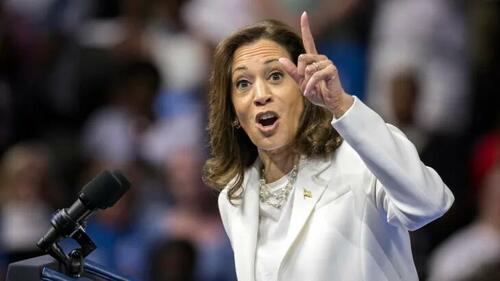Harris’ So-Called ‘Surge’ Is Thanks To Oversampling: Pollsters
As we’ve been highlighting since 2016, polls are not to be trusted thanks to various ‘tricks of the trade’ – most commonly, oversampling.
Last month we noted how the founder of the main outside spending group backing Kamala Harris for president says their own internal opinion polling is “much less rosy” than public polls.
“Our numbers are much less rosy than what you’re seeing in the public,” said Future Forward super PAC president Chauncey McLean said during a Monday event hosted by the University of Chicago Institute of Politics.
Now, the Washington Times reports that some pollsters are even sounding the alarm over Vice President Kamala Harris’ so-called ‘surge’ in the polls – which Harris pulled ahead in after replacing President Joe Biden as the Democratic nominee on July 21.
Since the switch, Harris is leading Trump nationally by nearly 2 percentage points and is either leading or tied with him in all seven battleground states. However, Republican analysts argue that these polling numbers may not accurately reflect voter sentiment due to biased polling methodology.
If you want to see examples of polling bias, click into this thread on X…
In the meta data from the call centers college educated Dems are 3-4x more likely to answer than non-college. While weighting can help minimize the bias if done correctly it won’t totally eliminate the problem.
— Mark Davin Harris (@markdharris) August 16, 2024
Critics point out that many polls have been sampling a disproportionately smaller share of Republican voters compared to exit poll data from the 2020 presidential election. The result, they say, is a misleading “phantom advantage” for Ms. Harris. According to them, this skewed sampling could be a strategic move to boost enthusiasm and fundraising for Ms. Harris’ campaign.
Trump campaign strategist Jim McLaughlin echoed this sentiment, stating, “They undersample Republicans” intentionally “to tamp down support and donations for Trump.” He added that the polls are part of a larger effort to create a narrative that favors Harris.
Trump has openly criticized the poll results. “It’s fake news,” Trump declared during a rally in Michigan. “They can make those polls sing.”
“They are on to us, we can’t keep oversampling Democrats anymore to rig the polls”
“Here’s an idea: let’s just massively oversample women to push Kamala, they’ll never figure that one out”
“Brilliant, comrade!” pic.twitter.com/SqH58tHOQU
— zerohedge (@zerohedge) August 29, 2024
Harris’ recent poll numbers have indeed helped fuel excitement among her supporters, as evidenced by her campaign’s announcement of a $540 million fundraising haul in July, more than four times what Mr. Trump raised in the same period. Still, the growing skepticism over the legitimacy of the polls has prompted some to question whether the surge in support is as real as it appears.
Recent polls that show a Harris lead, such as the Suffolk University/USA Today poll, included more respondents identifying as Democrats (37.1%) than Republicans (33.8%). The poll found Ms. Harris leading Trump by 5 percentage points, a significant turnaround from earlier in the year when Trump was ahead by 4 points vs. Biden. Similarly, a Yahoo News/YouGov poll released on August 27 found Ms. Harris ahead of Mr. Trump by 1 percentage point, with Democrats making up 33% of respondents compared to only 29% for Republicans.
The discrepancy in party sampling is causing concern among poll watchers. Data from the 2020 exit polls showed a nearly equal split, with 36% identifying as Republican and 37% as Democrat. Yet, recent polls seem to favor Democrats disproportionately, leading to claims of deliberate skewing.
Mr. Trump’s pollster, Tony Fabrizio, has argued that these polls are designed to suppress support for Mr. Trump. In a memo, he stated, “Once again, we see a series of public surveys released with the clear intent and purpose of depressing support for President Trump.”
Pollsters like Don Levy of the New York Times/Siena Poll counter that these claims lack substance. They argue that any gaps between recalled 2020 vote and actual 2020 results are not evidence of intentional bias but may reflect the complexity of polling dynamics, including response bias where Democrats are more likely to participate in polls.
Despite these excuses, the controversy surrounding these polls has left many wondering about the true state of the race. Polling analysis site FiveThirtyEight shows Ms. Harris’ approval rating ticking up to 42.3%, up from 37.1% in early July. Yet, doubts persist over how she has managed to rise in the polls without significantly improving her historically low job approval ratings.
Tyler Durden
Tue, 09/03/2024 – 18:00
via ZeroHedge News https://ift.tt/po3QrEU Tyler Durden
